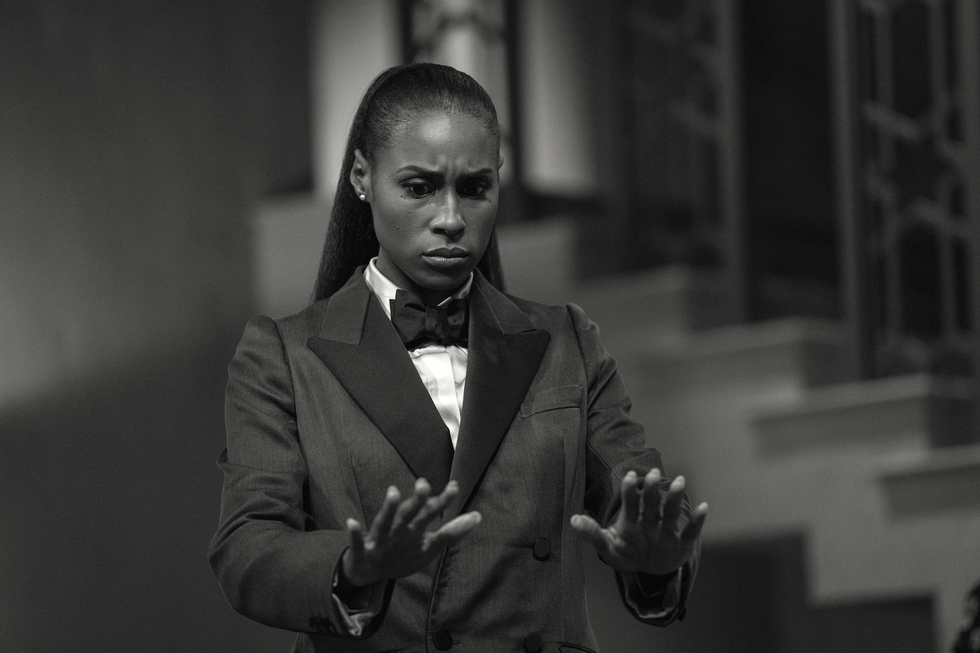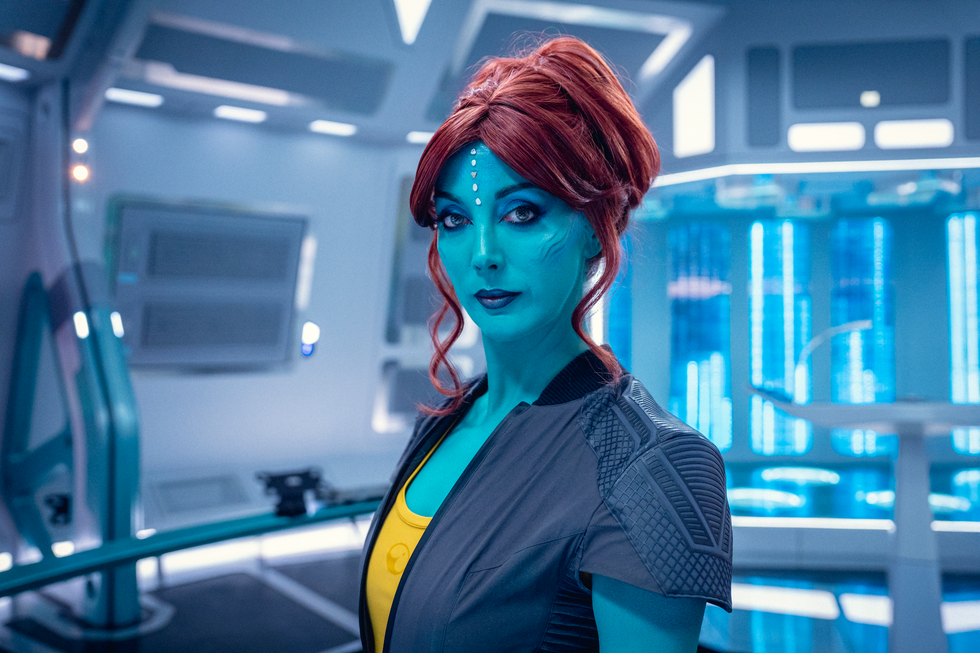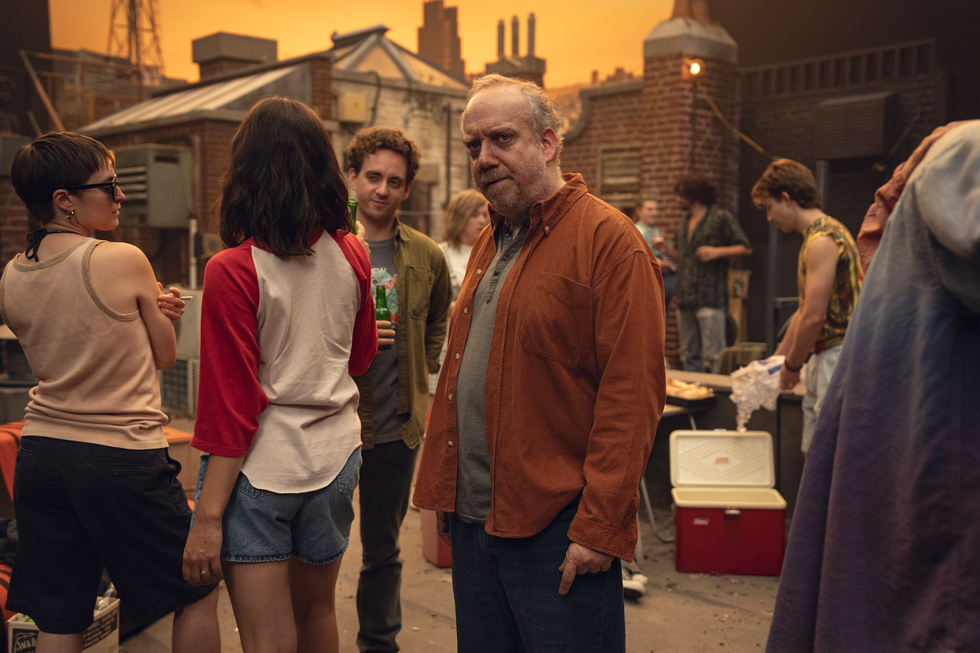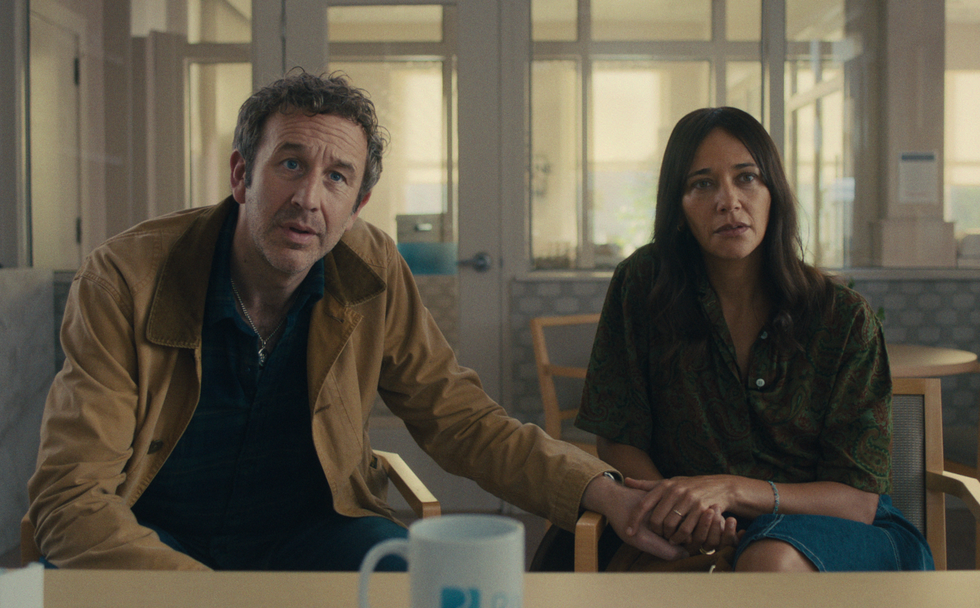<i>Black Mirror</i> Season 7 Episodes, Ranked: The Good, the Bad, and the Terrifying

Spoilers below.
Back in 2023, the sixth season of Netflix’s acclaimed sci-fi anthology series Black Mirror left me of two minds about the future of the show. I admired how showrunner Charlie Brooker had reignited the show’s renewed energy, but lamented his shifting of the goalposts. Yes, the best episodes (“Demon 79” and “Loch Henry”) did showcase the vicious humor and queasy shocks that built Black Mirror‘s reputation, but they did so at the expense of the show’s core conceit. Black Mirror has always been a show about the disruptive power of technology. And so it was strange that, just as AI, cryptocurrency, and deepfakes were primed to unravel the grand narratives of human experience, Brooker’s techno-paranoid anthology swerved left into serial killers, werewolves, and demonic pacts.
Cue season 7. I’m happy to report that the new season, as a whole, demonstrates a sharp return to what Black Mirror does best: nightmarish philosophizing about the ever-accelerating tech threshold and our paltry human efforts to keep pace. Brooker remains the driving genius behind each episode and—though William Bridges, Ella Road, Bekka Bowling, and Bisha K. Ali are each credited as co-writers on various episodes—there is scant impression of any point of view swaying Brooker from his dystopian outlook.
None of season 7’s episodes roam far from well-trodden ground. We get plenty of classic Black Mirror material: sinister video games; synthetic enhancements; a familiar fixation with fallible human memory; and, in “Into Infinity,” the show’s first overt sequel (to season 4’s standout “USS Callister”). Black Mirror has not felt so Black Mirror in years. Brooker does throw us a palliative bone with one lovelorn miniature epic, and the raw human comedy is more obvious throughout. But beneath the jokes and the Netflix production value, it’s plain that Black Mirror is re-committed to asking the existential questions that keep us up at night (and terrified of our Alexas).
How you feel about this new season, then, will depend on a) whether you want the show to cleave toward or away from its past glories, and b) your personal appetite for bleakness, sorrow, and void-black comedy. Your mileage may vary, but I’m all in on the darkness. It reflects reality like a good mirror should.
Below is my ranking of season 7’s six episodes, from worst to best.
No. 6 | Episode 2, “Bête Noir”
Arthur C. Clarke famously wrote that “any sufficiently advanced technology is indistinguishable from magic.” Brooker has taken this notion and run with it, giving himself complete license to dream up whatever next-gen device he needs to pursue his ideas, with only the most cursory gesture at scientific explanation. Of course, Black Mirror is “soft” sci-fi—a tradition more concerned with character and philosophical concepts than nuts, bolts, or microprocessors. That’s fine. But even by Brooker’s own standards, this season’s tech often feels as if it’s been beaten into submission in the sole service of plot convenience.
“Bête Noire” is the worst example of this by far. And it’s a shame, because the silliness of the so-called science critically undermines an otherwise effective workplace thriller.
“Bête Noire” introduces us to Maria (Siena Kelley), a product developer for the global confectionery company Ditta (one of many brands that reappears throughout Black Mirror‘s increasingly connected universe). During a focus group session for a new product, she’s surprised to recognize a former schoolmate, Verity (Rosy McEwan). Verity is confident and charismatic, and quickly convinces her disgusted peers that Maria’s new miso-flavored cookies are actually quite delicious.
Rather than gratitude, Maria seems to feel only disquiet at Verity’s presence—an unease made even worse when Verity reveals she’s applying for a junior position at Ditta. She’s soon hired, winning over Maria’s boss almost instantly with her portfolio of almost-too-perfect credentials. How could one woman have done so much? We may ask. Ahh, Brooker answers, that’s foreshadowing for you!
Almost as soon as Verity joins the firm, things start to sour for Maria. She loses a petty argument with a colleague, a communication mishap ends in the company CEO being fed beef gelatin, and Maria is outed as that worst-of-all office parasites: a milk thief.
However, each incident hints at something much weirder than the tidal flow of office popularity. Verity seems to possess the ability to alter digital evidence. Emails are changed after the fact; security cameras show things that Maria (and we, the audience) know not to be true. A moment of simple fact-checking becomes a terrifyingly targeted Mandela Effect when a Google search rattles Maria’s certainty about the details of her world.
If “Bête Noire” had stuck with this contained premise, it could have been a masterful triple-whammy: skewering our dependence on the internet as a remote brain; tackling the compromised nature of online information; and giving gaslighting a creepy sci-fi boost. Instead, Brooker goes for a much grander swing, introducing an all-powerful MacGuffin that takes Clarke’s maxim beyond absurdity. Brooker is more interested in the psychological impact of the device—with good reason; it’s horrifying—but I would have liked to see a bit more narrative effort.
No. 5 | Episode 3, “Hotel Reverie”
My opinion on this one might not go down well, because some people really love “Hotel Reverie.” I can understand why: The aesthetic is lovely, juxtaposing Black Mirror‘s now-familiar Silicon Valley sheen with the monochrome soft-focus of classic Hollywood. Also, it comes closest this season to being an actually heartwarming Black Mirror episode, with more than a few thematic nods to the season 3 fan-favorite “San Junipero.” That said, it lacks the clarity of message that sets the show’s most memorable episodes apart.
This time around, the magical tech is ReDream, an AI-driven tool to remake older movies with contemporary stars. A living actor’s consciousness is ported into an immersive re-creation of a film, where they perform their side of the script alongside oblivious digital avatars of the original cast. A failing studio sees this as a way to compete with the modern box office and recruits Kimmy (Awkwafina) to employ ReDream in remaking a ’40s hit melodrama. Kimmy and the studio reach out to actress Brandy Friday (Issa Rae), who agrees to play the role of the original male hero.
Once Brandy is plunged into the simulation, we’re invited to smile mildly through a few scenes of fish-out-of-water comedy, but it’s no surprise when the technology goes awry (with potentially existential consequences). There’s a semblance of a time-sensitive plot, with Brandy having to run the rails of the movie’s script all the way to a specific line of dialogue or remain stuck in the simulation forever. Convenient technobabble it may be, but it’s all secondary to the love affair between Brandy and her romantic co-star, Clara (Emma Corrin).
Corrin is a revelation in the role. In a season of individual performances that outshine their respective stories, Corrin’s is a particular delight. They’re so convincing as a ’40s movie star—all demure smiles and clipped transatlantic consonants—that it’s easy to forget they actually exist as a real person in our contemporary world. Their character’s dawning awareness of her own liminality is the emotional nugget at the heart of the episode, and it prompts questions about the ethics of posthumous image use, as well as the potential cruelty of keeping a sentient digital intelligence in an enclosure made for our own amusement. This second issue becomes especially thorny in the final scene, which Brooker seems to offer as a bittersweet consolation. Although, it could be interpreted as one of the most horrifying situations the show has ever set up.
Therein lies the problem with “Hotel Reverie.” It doesn’t seem to know what it’s trying to say. Are we watching an earnest tragicomedy with cyber enhancements, or a cynical commentary on the degradation of art into “content”? “Hotel Reverie” also could have been a fine chance to address the cultural backlash against gender-swapped roles and colorblind casting. Instead, it squanders that line of inquiry in a quick reference to Brandy’s frustration at only playing “noble victims or fuckable sidekicks.” When Brandy herself asks Kimmy how the digital cast of the film will react to a Black woman in the role of a white man, the script palms it off with some lazy guff about the digital avatars accepting whatever they’re shown.
At 78 minutes, “Hotel Reverie” ends up feeling overlong—yet somehow rushed when it comes to the stuff that matters.
No. 4 | Episode 4, “Plaything”
For some viewers, “Plaything” might feel like half an episode of Black Mirror: all build-up and delayed gratification that ends just as the story you think you want to watch begins. It might be especially frustrating to viewers who want to see the aftermath of its disarmingly cute threat being unleashed on the world. But I liked it for two reasons. First, that threat is genuinely interesting: a ’90s video game set on global dominance. Second, the world-building is revealed through gradual, organic storytelling. It’s one of two such highlights in a season that otherwise ignores the show-don’t-tell rule in favor of an exposition dump at the start of each episode.
Events begin in the approximate present, when a very bewigged man named Cameron (Peter Capaldi) is arrested for shoplifting. A police scan highlights genetic markers linking him to an unidentified corpse, and within minutes the action shifts to an interrogation room. The rest of the mercifully efficient episode is Cameron relaying his life story, a transformation from painfully awkward young man to eccentric raconteur, aided by hallucinogens and an experimental video game called Thronglets. The question seems to be how such a metamorphosis led him to murder.
Of course, the actual stakes are much bigger than that. The death of one single man is nothing compared to the world-shattering plan that Cameron is pursuing—and using the interrogation interview—to fulfill. Seconds before the episode ends, Brooker delivers an apocalypse-of-sorts that, though it may not be original—nor difficult to guess from about the halfway mark—still packs a chilling punch.
It’s fun watching Brooker trawl through decades of video game nostalgia. His own love for the medium is evident in the design of Thronglets. It has a perfect ’90s aesthetic, in the style of Lemmings or Age of Empires, and there’s something both charming and vaguely unsettling about its 8-bit lifeforms. Cameron’s obsessive relationship with the game provides a mix of comedy, horror, and pathos, each embodied by Capaldi, who is clearly having a ball.
But mostly “Plaything” succeeds because it scales back to deliver a streamlined, satisfying 45 minutes of television, uncluttered by too many satirical strands or axes to grind. This episode would have been right at home in the first two seasons of the show, before Netflix’s budget and relaxed runtime gave vent to Brooker’s grander ambitions. “Plaything” is proof that limitations can sometimes, in fact, hone television into a sharper weapon.
No. 3 | Episode 6, “USS Callister: Into Infinity”
“USS Callister” is a fan-favorite episode from season 4. It’s a clear meta-riff on Star Trek, in which aggrieved game developer Robert Daly (Jesse Plemons) uses his coworkers’ DNA to trap their sentient clones in a siloed corner of a mass-online roleplaying game under his malign captaincy. The complexity of that sentence alone should give you some idea how big a concept “USS Callister” was to execute, and how fully deserving of its feature-length runtime.
“Into Infinity” is a direct sequel—Black Mirror’s first—and it picks up after the digital crew’s escape from Daly’s in-game pocket universe into the larger mass-online platform, filled with 30 million other players. The big problem is that, while everyone else can simply re-enter the game should they die, for the crew, death is permanent. Inside the software, the crew struggle to stay alive and find a refuge, while—out in the real world—their flesh-and-bloody counterparts are battling to aid or destroy them. “Into Infinity” makes for an enjoyable, occasionally thrilling 90 minutes that could easily function as a standalone movie, untethered from Brooker’s franchise—had Galaxy Quest not covered a lot of this ground even more successfully back in 1999.
Both episodes’ biggest strengths are their wild tonal shifts. One moment “Into Infinity” is making jokes about stranded astronauts and their various uses for holes in rocks; the next, it’s prompting us to reflect on the evils of trapping a sentient clone in perpetual torment. If the sequel is slightly gentler than the first installment, that’s only by degrees. A great final confrontation offers a version of the “trolley dilemma” on a cosmic scale, and braves a real consideration of what drives lonely men to incel-like behavior.
As with almost all Black Mirror episodes that creep over the hour mark, “Into Infinity” is sometimes overstuffed. Once more Booker tries to pack in a whole slew of competing thought experiments. But for all its moving parts, and the scale of a movie experience, “Into Infinity” carries the extra baggage well. It ends on what could be construed as either a strangely wholesome family dynamic or a living nightmare. (Imagine a toxic version of Pixar’s Inside Out). Personally, I hope for the latter, as I’d like to see where this crew boldly goes next.
No. 2 | Episode 5, “Eulogy”
It’s probably clear by now that I think Black Mirror is at its best when it keeps things simple—or, at least, single-minded. “Eulogy” supports my thesis. Easily the quietest episode of season 7, it’s also the most heartfelt and honest about human failings. Technology is not an unmitigated evil in this one; the Eulogy memory aid that helps Phillip (Paul Giamatti) explore his memories of a lost love is potentially as much a blessing as a curse. But, like a more benign version of season 1’s “The Entire History of You,” “Eulogy” does suggest that total recall can come with a heavy price.
Giamatti is perfectly cast as Philip. Few actors can convey brimming sorrow so well without any need for histrionics. When Philip uses the Eulogy device to virtually step into old photos in search of happy times, Giamatti communicates all the wonder that such tech would inspire. Gradually, though, as Philip is forced to confront his own false narratives, fallible memories, and personal failings, anger begins to dilute his sadness.
“Eulogy” is a wonderful character study of a man reckoning with himself. It would have been interesting to see Giamatti carry the hour solo, but Brooker can’t resist including the inevitable Black Mirror Digital Avatar™. This time it’s The Guide (Patsy Ferran), who accompanies him through his memories, her own supposedly neutral demeanor showing cracks, through which we can glimpse the fairly obvious twists to come.
The episode’s digital effects are as quiet as its other elements—and too easily overlooked compared to the bombast of “USS Callister: Into Infinity” or the cinematic mimicry of “Hotel Reverie.” Nonetheless, “Eulogy” is a real visual feat. The 3D renderings of Philip’s photographs are a delight to explore, and the tech is cleverly thought through. It’s a standout marriage of concept, aesthetic, and performance. And it does what Black Mirror can do better than any other TV show: envision near-future technology to say something about how human beings have always been.
No. 1 | Episode 1, “Common People”
There’s plenty to criticize about even the best of Black Mirror’s seventh season, much of which I’ve levied more harshly at other episodes. “Common People” is overly ambitious. It tries to cover too many hot topics. It offers another version of the human-tech enhancement that has long been the show’s hobby horse. It looks too clean; too shiny; too Netflix. Despite all that, the premiere episode succeeds simply by twisting the knife until you squeal.
Mike (Chris O’Dowd) and Amanda (Rashida Jones) are a deeply loving—and lovable—couple. But after Amanda collapses due to an undiagnosed brain tumor, Mike learns there is little chance of her ever waking up again. In his desperation, he’s willing to open his mind (and wallet) to Gaynor (Tracee Ellis Ross), a sales rep from the experimental tech startup Rivermind. Gaynor offers what seems like a lifeline: Rivermind can upload the cancerous section of Amanda’s brain to their cloud servers, allowing doctors to remove it safely. For the cost of a monthly subscription, Rivermind will then stream Amanda’s cognition back to her, allowing her to live a healthy life.
It seems too good to be true—and, of course, it is. As Rivermind begins to up its fee, Amanda and Mike struggle to make ends meet. Even worse, as lowly subscribers to Rivermind’s “common” tier, Amanda begins to suffer. She’s forced to sleep more while the company harnesses her brain power to fuel higher-tier members. In a darkly hilarious twist, she also becomes a hostage to advertisers, with context-driven ads overriding her speech like a form of ultra-capitalistic demonic possession.
From there, things only get worse and worse, and Brooker sprays his satirical venom in all directions. “Common People” confronts the scandal of private healthcare, the exploitative nature of sites such as OnlyFans, the ruthless profiteering of tech start-ups, and the toxic promises of wellness culture. Brooker’s primary target, however, is the very hand that feeds him. As in season 6’s “Joan is Awful,” “Common People” casts shade at streaming services. And it’s not just Netflix and their competitors who take the hit. Amanda’s fate exposes the precipitous nature of our entire contemporary subscription culture. It’s a cruel downward spiral that shows the worst possible consequence of offloading our wellbeing and livelihood to a third party’s server.
In Gaynor, Brooker has given us a villain for our age. Ostensibly human when seeking Amanda and Mike’s money, then gymnastically elusive when asked for financial mercy, hers is the perfectly filtered face of capitalism, red in tooth and claw.
The ending is bleak, made more so by a shockingly dark joke that will make or perhaps break the entire episode, depending on your tastes. For me, it worked both ways. I laughed out loud, then stared at the TV in anxious consideration, long after the screen had turned black.
elle





